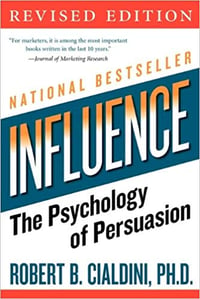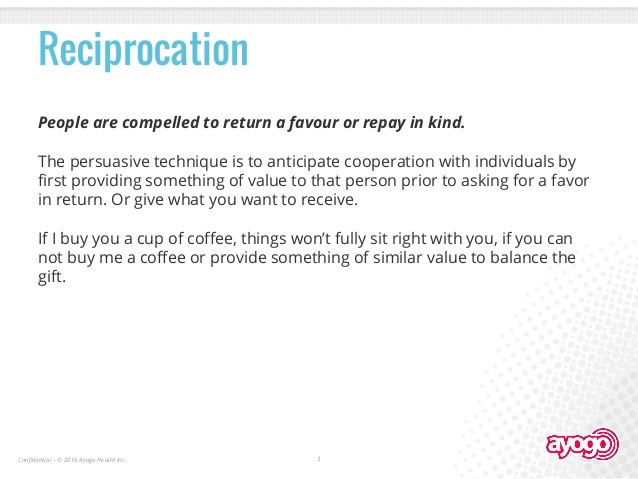 You’ve just had a delicious meal at a fine restaurant, your waiter or waitress approaches to present you with the bill. What can he or she do to significantly increase the tip you will give them?
You’ve just had a delicious meal at a fine restaurant, your waiter or waitress approaches to present you with the bill. What can he or she do to significantly increase the tip you will give them?
This was one of the questions Dr. Robert B. Cialdini posed to his audience at the Gazelles sponsored Small Business Fortune Magazine Growth Summit in Las Vegas in late October. It is Persuasion Principle #1 – Reciprocation, or as he calls it the old give and take. In a tipping study completed in New York, there are certain steps your server can take to amplify the tip they will receive based on the principle of reciprocation. – If I give you something you will feel obligated to give something back in return. In this case if your server provides you with one mint per diner his tips will increase 3.3% from the norm. IF he provides two mints per diner his tips will increase 14%. Pretty good so far, right? The question you may be asking yourself is why do so many restaurants only sell those mints at the hostess station then? If you are a waiter or waitress reading this, I’d consider purchasing mints in mass quantities and begin providing them at 2 per diner to significantly increase my earnings.
 But wait there is one more option. Your server approaches your table with the bill carrying one mint per diner; he sets it on the table, thanks you and then turns to leave. Just two steps from the table he/she pirouettes, comes back and says, Mr. and Mrs. X you’ve been such good guests tonight, one mint just isn’t enough. Then he/she individually places one additional mint in front of each diner, thanking you for coming this evening. Tips soar to 23%!
But wait there is one more option. Your server approaches your table with the bill carrying one mint per diner; he sets it on the table, thanks you and then turns to leave. Just two steps from the table he/she pirouettes, comes back and says, Mr. and Mrs. X you’ve been such good guests tonight, one mint just isn’t enough. Then he/she individually places one additional mint in front of each diner, thanking you for coming this evening. Tips soar to 23%!
Dr. Robert B. Cialdini suggests that for reciprocation to work best it must be:
- meaningful
- unexpected
- tailored to the needs of the person receiving it
Can you see how the tipping example exemplifies this? Interestingly enough you can lose the value of this principle by not acknowledging the opportunities you have either. Speaking to another group, Cialdini recalled the awful expression one of his audience members got on their face when he told this story on reciprocation. The audience member then recalled how his company had taken great pains to service their best customer, sending not one but two of their best techs to their site, along with himself, the owner. When they completed their work, discovering the problem was much simpler than they had feared, the client thanked them for taking the extra effort to service them. How did this business owner respond? He made light of it, diminished their efforts, even to the point of saying, we would do this for anyone. He recalls seeing his client’s representative’s facial expression disappear and the sour in disappointment when he responded.
It was only after hearing Dr. Cialdini’s explanation of reciprocation that he got what he should have done in this situation. He could have chosen several ways to respond, simple saying this is the type of service you deserve and can expect to continue to receive from our company, what else can we do while we are here? Better yet he could have responded by saying, “It’s what long term partners do for one another!” Or perhaps “we’re glad to be of service, it’s what long term relationships are built on, I’m sure if the situation were ever to be reversed you would do the same for us.”
Instead he diminished the exceptional service he had offered, lost the opportunity to make his customer feel obligated to him and the result…. This customer never did any more business with is company. Dr.Cialdini offers that we are afforded a moment of persuasion power after receiving a genuine thank you for a service we have provided. In many cases we lose that power by simply being unaware of the great opportunity we have to activate it.
What can your business do to use the law or reciprocation to its benefit? Can you do something meaningful, unexpected and tailored of the needs of your customer? Give that some energy and you may be surprised what you can come up with. For less than the cost of a mint [or two] it might make an extraordinary difference in the tips you might get.
More of Dr. Robert Cialdini’s Persuasion Principles in my next blog.






.jpeg?width=150&height=135&name=Hand%20with%20marker%20writing%20the%20question%20Whats%20Next_%20(1).jpeg)

